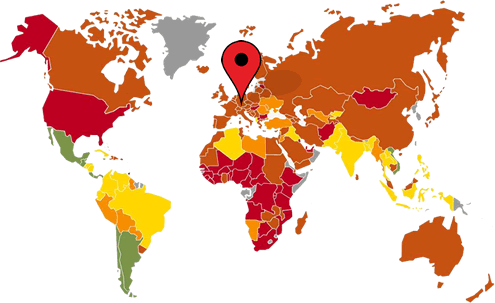Teaching English in Munich, Germany

Report submitted on 11 January, 2015 by Lisa.
Teaching English in Munich, Germany:
How can teachers find teaching jobs in Munich, Germany?
Over the internet – ToyTown is the expat forum and I found my three agencies through the job search forum.
In the newspaper – sometimes individuals or small groups will advertise for Nachhilfe.
Word of mouth – other expats will refer jobs that they can’t take onto people they know.
The main English teaching jobs available are:
Agencies (send teachers to different locations), teaching at kindergartens / pre-schools, teaching at private international schools, teaching at companies, teaching at community centers, etc., private teaching (not through a school, agency, etc.)
What are the minimum teaching requirements?
You really need to be a native speaker. Germans already have a very good level of written English – in most cases they are after native speakers with whom they can practice and improve their spoken language. Obviously the better qualified you are, the more likely you are to be employed. That said, I have met a couple of people who have no specific teaching qualifications, but have a different career and therefore have been in demand as business English teachers.
What teaching requirements would you recommend?
A TESOL certificate would be of great benefit.
What are the levels of payment?
It really varies. The usual schedule is based on a 45 minute teaching unit (UE) and most companies will book you for two UE in a block (single UE for kids classes). I work for three different agencies and receive between €19 and €24 per UE. I interviewed for a couple of places that only offered €15-17 per UE. Keep in mind that you are never paid for preparation time, and rarely for travel time. Of course as a freelancer you have to pay your own tax, insurance etc.
How many teaching days a week is normal?
3-5 days per week.
How many face-to-face teaching hours a week is normal?
15-20 hours per week.
What is the normal arrangement for holidays?
As a freelancer, obviously if I don’t work, I don’t get paid.
What advice would you give to someone considering coming to Munich, Germany to teach English?
Have a qualification and an interest in teaching English. (That would be my advice to anyone, teaching anything, anywhere.) Teaching is an important job and students here value their education.
What are the positive aspects of teaching English in Munich, Germany?
Moving around and meeting people. The students are interested, engaged and appreciative.
What are the negative aspects for teaching English in Munich, Germany?
This would be the case for freelancing anywhere: lots and lots of unpaid prep time. Some unpaid travel time. Lots of admin (again unpaid).
What are some of the teaching challenges for English teachers teaching the local people in your area?
As a native speaker I acquired my grammatical knowledge communicatively. I have been asked some curly grammatical questions by some students who have taken a very structured approach to their language learning – on a couple of occasions I have needed to look up the “rules” in between classes in order to give a correct response.
Living in Munich, Germany:
Are there any visa or other legal requirements to live in Germany?
If you are a member of an EU country you are eligible to work here. As an Australian I needed to obtain an Aufentshaltitel – easy for me as I am the wife and Mum of German citizens.
What is the cost of living like in Germany?
Munich is EXPENSIVE in terms of rent. A public transport pass varies depending on how far you need to go, but my pass that covered the whole city area costs €74 per month – very reasonable given the extent and reliability of the network. Groceries are cheap and if you are in student-oriented areas you can find cheap places to eat out.
What are the usual accommodation arrangements and how can you find accommodation?
Some people live in share houses or dormitories. Newspapers and internet searches are of course helpful. It is difficult to find rental accommodation in Munich. We found a place relatively easily because we were prepared to live outside the centre of the city.
Other than teaching, what positive aspects are there for living in Munich, Germany?
It is really, really beautiful. German food and culture is wonderful.
Other than teaching, what negative aspects are there for living in Munich, Germany?
Paperwork. Seriously. You need to spend quite a bit of time getting yourself registered and so forth. It can be frustrating to navigate the bureaucracy here.
What advice would you give to someone considering coming to Munich, Germany?
Learn German first. A lot of people speak English, but you can’t rely on that.
What things do you miss most (other than family and friends) from your home country?
Darrel Lea licorice bullets.
What do you think you will miss most when (or if) you leave Munich, Germany?
The people. The scenery. The food.
About Me and My Work:
My Name: Lisa
Nationality: Australian
Students I’ve taught in Germany: Pre-school / kindergarten (4-6 years), elementary (6-12 years), adults, business
Where I teach: teach for three different agencies and have been approached for private lessons as well. Working here for 1 year.
How I found my current jobs: Through the ToyTown jobs available forum.
My school facilities: Good – I don’t often have internet connectivity, projectors, CD players etc, but there’s usually whiteboards, flip charts and comfortable seating, good lighting, clean, quiet facilities etc.
Teacher support at my school: Training / workshops, lesson observations, teacher evaluations.
Do you teach English in Germany?
Tell us about your experiences – click here to submit your report about teaching English in Germany.


